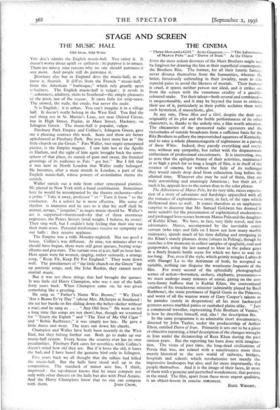EVEN the most ardent devotees of the Marx Brothers might
well be forgiven for drawing the line at their superficial counterparts, the Brothers Ritz. The former, for all their lunatic fantast never divorce themselves from the humanities, whereas the latter, ferociously unbending in their joviality, seem to take especial pains to avoid the likeness of mortals. Their humour is cruel, it spares neither person nor ideal, and it strikes our from the screen with the venomous crudity of a gaudily- coloured snake. Yet their talent—both several and combined— is unquestionable, and it may be beyond the issue to criticize their use of it, particularly as their public acclaims them with such hysterical, if masochistic, glee.
At any rate, Three Men and a Girl, despite the drab un- originality of its plot and the feeble performances of its other characters, is, thanks to the unholy trio, a film worth attention. The chicaneries of the sponsored radio operators and the vicissitudes of outside broadcasts form a sufficient basis for the Ritz Brothers to pillory the impoverished squatters of Kentucky, and to raise a whole phantasmagoria of nightmares in a parody of Snow White. Indeed, they parody everything and every- one, without any sympathy, but rather with the dispassionate enthusiasm of professional executioners. It is interesting, too, to note that the epileptic frenzy of their activities, maintained at so high a pitch for so long a length of fihn, is in itself of the essence of cinema, for without the help of its technique they would surely drop dead from exhaustion long before the allotted time. Whatever else may be said of them, they are truly astonishing and amazingly American ; but their art, if such it be, appeals less to the cortex than to the solar plexus.
The Adventures of Marco Polo, by its very title, raises expecta- tion of a story of adventure and hardships apparelled with all the romance of exploration—a story, in fact, of the type which Hollywood does so well. It comes therefore as an unpleasant surprise to discover that Mr. Samuel Goldwyn has deemed it more suitable for the presentation of sophisticated modernisms and prolonged love-scenes between Marco Polo and the daughter of Kublai_ Khan. We have, in fact, very little travel, and few adventures. Marco, accompanied by the inevitable comic servant (who trips and falls on I know not how many marble staircases), spends much of his time dallying and intriguing in the Khan's stately pleasure dome (situate in Peking), though he snatches a few moments to collect samples of spaghetti, coal and gunpowder, using the last named to blow in the palace gates in a finely frenetic battle scene for which we have to wait far too long. For, even if the style, which grimly mingles Lubitsch with Shangri La to the detriment of both, be accepted as suitable, nothing can disguise the wearisome longueurs of the film. For every second of the splendidly photographed scenes of action—horsemen, archers, elephants, processions— we must undergo many minutes of ennui, gazing on the not- very-funny buffoon that is Kublai Khan, the conventional cruelties of his treacherous minister (admirably played by Basil Rathbone), the static prettiness of Sigrid Gurie as the Princess, and worst of all the wanton waste of Gary Cooper's talents as he parades (surely in desperation) all his most hackneyed gestures across marbled patios or sunbaked plains alike. " Just a commercial traveller, representing Polo Brothers of Venice," is how he describes himself, and, alas ! the description fits.
In the same programme is an admirable short documentary, directed by John Taylor, under the producership of Arthur Elton, entitled Dawn of Iran. Primarily it sets out to be a piece of objective reporting, a brief description of the changes wrought in Iran under the dictatorship of Reza Khan during the past sixteen years. But the reporting has been done with imagina- tion. The vistas of past time, the long-dead civilisations of Persia that was, are related with a sensitiveness more than merely historical to the new world of railways, bridges, hospitals and schools which revolutionise not merely the impressive landscapes but also, and far more importantly, the people themselves. And it is the image of their faces, lit most of them with a genuine and perturbed wonderment, that persists in the mind. The film, apart from these more urgent qualities, is an object-lesson in concise statement.
BASIL WRIGHT.






































 Previous page
Previous page